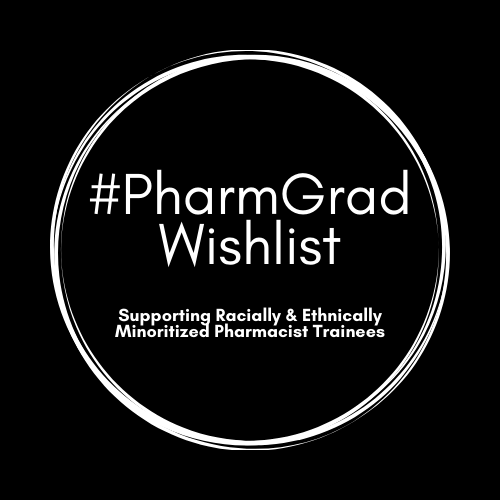#PharmGradWishlist supports minoritized pharmacy trainees
May 8, 2024
Erin Wilson

Started from a social media post shared in 2021 by Dr. Elizabeth Hirsch, #PharmGradWishlist (PGWL) is an organized mutual aid movement supporting racially and ethnically minoritized pharmacy trainees in the college and across the country.
The movement, now going on its fourth year, financially assists minoritized pharmacy trainees with costs that aren’t typically covered by federal student funding, such as application fees, travel costs, board exam and licensing fees, and moving expenses— and to bridge the gap of unemployment that graduates may face during the transition from school to employment. The goal is to remove some of the barriers to pursuing a career in pharmacy.
Inspired by the success of #MedGradWishlist created for physician trainees, Dr. Hirsch put out feelers on Twitter (now known as X) to see if there was any interest in another version of the movement.
“If physicians can do this, why can’t we do this for pharmacists?” Dr. Hirsch said. “And then a bunch of people messaged me saying, ‘I’d love to be a part of that.’” Ten practicing pharmacists from across the country then came together to start PGWL.
While PGWL began with a simple spreadsheet of Amazon wishlist links, it has since expanded to include a website, blog, podcast, published papers, and more.
In 2022, PGWL partnered with Hematology/Oncology Pharmacy Association (HOPA) to expand the opportunities they offer to trainees and additionally, through crowdfunding, raised over $20,000 for pharmacy trainee sponsees. They went on to partner with the American Society of Health-System Pharmacists (ASHP) Foundation in 2023 to fund travel awards to the society’s midyear meeting to 50 pharmacy trainees. They received over 300 applications.
On top of financial assistance, PGWL aims to support trainees in other ways, like mentorship programs and scholarships to annual conferences. Dr. Hirsch says they have also published several papers with trainees as the first or second author to both amplify their voices and to familiarize them with the publishing process. In one of their earlier papers, “Brighter Horizons: The Necessity of Concentrated Sponsorship Targeted Toward Minoritized Pharmacy Students,” authors write that “while there is no way to quantify funds that have been contributed to sponsees via wishlist item purchases or peer-to-peer payments, there were 220 sponsees listed on [their] website” at the time of writing1.
In the past, PGWL has held large item lotteries for expenses like the NAPLEX board exam or moving costs for those relocating to new states for their residencies. Dr. Hirsch recalled being on a call with one of the randomly selected trainees whose apartment burned down shortly before graduation; he lost nearly everything. PGWL was able to raise $800 last minute to help him recover.
“Those meetings were humbling… to hear the barriers that some of them have had,” she said. “A lot of those meetings were very emotional, very impactful.”
Now, they’re looking for new ways to publicize their work because many people left Twitter after its change in ownership, Dr. Hirsch said, and the social platform contributed greatly to spreading the word.
“The amount of pharmacy people on Twitter is not what it was before and that’s one of the reasons why this year we’re not doing the large item lottery campaigns,” she said. “The amount of money we raised for the travel award was way lower than in 2021-22, and we do think it’s partly because people just aren’t engaged on Twitter like they were before.”
Going forward, PGWL is working toward nonprofit status, writing a manuscript to publish the work that went into the AHSP partnership, and publishing the rubric they created to evaluate award applicants so that others can implement it into their own organizations.
Dr. Hirsch said PGWL approached multiple national pharmacy organizations while searching for partnerships, and often received responses like, “Well, is DEI going to be one of those fads? Are you going to keep this going?'’
“If you look at the pharmacy workforce, it’s very obvious that we need providers that are concordant with patient race because data have shown that it improves patient outcome,” she said. “We’ve kept this up since 2021 and have hopefully shown other organizations that this isn’t just a fad, we have stayed committed to this initiative and its mission.”
1Caroline L. Ko, Jacinda C. Abdul-Mutakabbir, Kevin N. Astle, Aiman Bandali, Judah E. Brown, Lindsey M. Childs-Kean, Elizabeth B. Hirsch, Jason Mordino, Ila M. Saunders, Britny R. Brown. Brighter horizons: The necessity of concentrated sponsorship targeted toward minoritized student pharmacists. Journal of the American Pharmacists Association. Volume 62, Issue 3, 2022. Pages 701-705. ISSN 1544-3191. https://doi.org/10.1016/j.japh.2022.03.004.